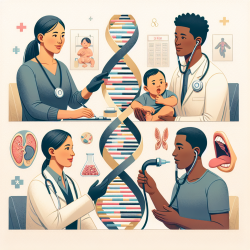Introduction
In the ever-evolving field of speech-language pathology, staying informed about the latest research can significantly impact the effectiveness of therapy. The recent study titled Defining the genotypic and phenotypic spectrum of X-linked MSL3-related disorder offers valuable insights into a rare genetic condition that can influence developmental outcomes. Understanding the implications of this research can empower practitioners to tailor their approaches, ultimately improving the lives of children they serve.
Understanding MSL3-Related Disorder
The MSL3-related disorder, also known as Basilicata–Akhtar syndrome, is an X-linked neurodevelopmental disorder that affects both males and females. The disorder is characterized by a range of clinical features, including developmental delay, intellectual disability, autism spectrum disorder, and distinctive facial features. The study identified various genetic variants in the MSL3 gene, which plays a critical role in chromatin remodeling and gene expression.
Implications for Speech-Language Pathologists
For speech-language pathologists, understanding the genetic underpinnings of developmental disorders is crucial for designing effective interventions. Here are some key takeaways from the research:
- Developmental Delay: All individuals in the study exhibited developmental delays, with speech delay being a prominent feature. This highlights the importance of early intervention and tailored speech therapy programs.
- Autism Spectrum Disorder (ASD): ASD was diagnosed in 50% of the individuals, emphasizing the need for speech-language pathologists to incorporate strategies that address social communication challenges.
- Interdisciplinary Collaboration: The research underscores the importance of working closely with geneticists, neurologists, and other specialists to provide comprehensive care for children with complex needs.
Data-Driven Approaches
Incorporating data-driven approaches into therapy can enhance outcomes for children with MSL3-related disorder. Speech-language pathologists can leverage standardized assessments and progress monitoring tools to track improvements and adjust interventions as needed. Additionally, staying informed about emerging genetic research can provide insights into potential therapeutic targets and strategies.
Encouraging Further Research
While the study provides a comprehensive overview of MSL3-related disorder, there is still much to learn about the condition. Practitioners are encouraged to stay engaged with ongoing research and consider participating in studies that explore the genetic basis of developmental disorders. By contributing to the body of knowledge, speech-language pathologists can help drive advancements in therapy and improve outcomes for children worldwide.
Conclusion
Understanding the genetic basis of developmental disorders like MSL3-related disorder is essential for speech-language pathologists seeking to provide the best possible care. By integrating insights from the latest research, practitioners can develop more effective, personalized interventions that address the unique needs of each child. To delve deeper into the original research, please follow this link: Defining the genotypic and phenotypic spectrum of X-linked MSL3-related disorder.










